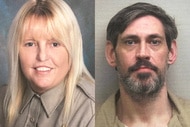Create a free profile to get unlimited access to exclusive videos, breaking news, sweepstakes, and more!
California Couple Sues Fertility Clinic Over Embryo Mix-Up That Resulted In Birth Of Another Family's Baby
“Losing the birth child you know, for the genetic child that you don’t know yet. A truly impossible nightmare that inflicted trauma that will affect my family and me for the rest of our lives," Alexander Cardinale said of the heartbreaking baby switch.

After years of struggling with infertility Daphna Cardinales gave birth to a healthy baby girl in September of 2019.
But months later, after the doting family had showered their new addition with love and affection, they learned the baby was not their biological child and Daphna had actually given birth to a stranger’s child, according to lawsuit obtained by Oxygen.com.
Adding even more heartbreak, Daphna and Alexander Cardinales’ biological child had been carried to term and was being raised by strangers as the result of a horrifying in-vitro fertilization mix-up at a California fertility clinic.
"When I found out she wasn't mine I poured more love into her. Maybe I was just clinging to her. I was just so scared I was going to lose her, which I ultimately did," Daphna Cardinale said, according to CBS News.
When the mistake was realized months later, the couples switched the babies back to their biological parents, but the Cardinales say the trauma and devastating heartbreak of the experience has left a lasting impact on their family.
“I was overwhelmed by feelings of fear, betrayal, anger and heartbreak,” Daphna said during a news conference this week to announce the lawsuit, according to The Associated Press. “I was robbed of the ability to carry my own child. I never had the opportunity to grow and bond with her during pregnancy, to feel her kick.”
The couple is now suing the California Center for Reproductive Health (CCRH), Dr. Eliran Mor, an IVF laboratory and surgical center for negligence, breach of contract, medical malpractice, negligent infliction of emotional distress and battery over the mistake.
"They entrusted CCRH and Dr. Mor with their dreams of having a child, as well as with their most sensitive and important property: their embryos,” the lawsuit states.
The lawsuit alleges the defendants violated the couple’s trust in “a shocking manner” when Daphna became an “unwilling and unknowing surrogate for an unknown couple.”
“The Cardinales, including their young daughter, fell in love with this child, and were terrified she would be taken away from them,” the lawsuit states. “All the while, Alexander and Daphna did not know the whereabouts of their own embryo, and thus were terrified that another woman had been pregnant with their child—and their child was out in the world somewhere without them.”
Alexander said after the couple welcomed their second child in September of 2019, he immediately felt that something wasn’t right after noticing that the girl’s complexion and hair that seemed darker than both of her parents.
“I had a weird, sort of gut reaction when she was born,” he said, according to CBS News. “It wasn’t anything logical. It was just like an instinct.”
To ease her husband’s concerns, Daphna bought DNA kits for the family a few months later and was shocked to learn their new baby had no genetic link to the couple, according to the lawsuit.
They reached out to the fertility clinic where they had undergone the procedure and learned that two embryos had been switched at some point during the process, leaving them with the wrong embryo.
“The long-term consequences of this baby swap continue to haunt their entire family,” the lawsuit contends.
The couple now fears that their oldest daughter—who had loved and already bonded with the young baby before she was taken from the family—has “suffered life-changing emotional damages” that have manifested into severe physical health problems.
Daphna described the moment she had to tell her daughter, now 7, that the doctors had mixed up the embryos as the “hardest thing in my life,” according to the Associated Press.
“My heart breaks for her, perhaps the most,” she said.
After the mix-up was discovered, the Cardinales and the other family—who has chosen to remain anonymous—met up several times before they switched the babies for good in January of 2020, although the families still try to make an effort to remain in each other’s lives.
According to attorney Adam Wolf, who represents all four parents, the other couple plans to file their own lawsuit in the next few days.
“When the truth came to light, it made exchanging the children all the more heartbreaking,” Alexander said during the press conference, according to Law & Crime. “Losing the birth child you know, for the genetic child that you don’t know yet. A truly impossible nightmare that inflicted trauma that will affect my family and me for the rest of our lives.”
Yvonne Telles, an office administrator for the fertility clinic, declined to comment on the lawsuit to The Associated Press.
Oxygen.com also reached out to the clinic, but did not receive an immediate response.
Wolf believes the couple’s shocking story highlights the need for greater oversight of fertility clinics, a booming $8 billion industry, according to the Southern California News Group.
Arthur Caplan, the founding head of the Division of Medical Ethics at NYU Grossman School of Medicine in New York City, told the news outlet despite the success of the industry there are little regulations in place to regulate it.
“The IVF world is a business,” he said. “It needs regulations to cover liability for error. Inadequate screening. Loss of storage capability and loss of gametes and embryos. Standardized informed consent. Legal help for donors and surrogates paid by couples. Audits and sight visits.”
Just last year, HBO released the documentary "Baby God" which followed the story of Dr. Quincy Fortier, a fertility doctor who unwittingly impregnated dozens of women with his own sperm.
Jody Lyneé Madeira, a professor of law at Indiana University Maurer School of Law, told Oxygen.com at the time that Fortier wasn't the only fertility doctor to have been accused of deceitfully impregnating his patients.
“I think it’s really between 20 to 30 cases now, some of which are public and some of which are not,” she said























